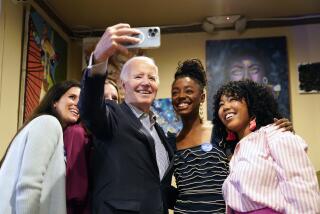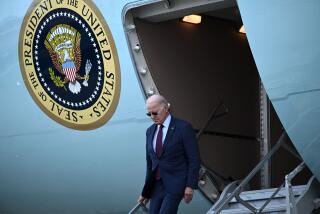Bush Pledges to ‘Go Extra Mile’ to Restart Economy : Politics: The President, looking at what could be a difficult reelection bid, responds to voter discontent.
- Share via
WASHINGTON — With morning-after contrition, President Bush vowed Wednesday to “go the extra mile” to restart the stalled economy during a stay-at-home November as he responds to an off-year election message of domestic discontent.
The grudging concession that his attention may have been wrongly focused comes at the end of one of the worst political weeks of his presidency and marks an unmistakable attempt by Bush to reposition himself for what suddenly looms as a troublesome reelection bid.
“We’ll try even harder,” Bush pledged at an early-morning news conference in acknowledging that the drubbing suffered by former Atty. Gen. Dick Thornburgh in a special election for the U.S. Senate in Pennsylvania left no doubt that Americans are “concerned about their livelihood.”
The President spoke before leaving for Rome and the Hague on a three-day trip. But it was a measure of his discomfort that he saw the need to defend the journey as likely to serve American economic interests.
And after postponing another trip to Asia planned for later this month, Bush said he had concluded that his priority must be to keep an eye on Congress during partisan wrangling over remedies for the nation’s prolonged economic distress.
And with his party also being criticized for exploiting racial animosities, Bush said for the first time that--if he could vote in Louisiana--he would vote for the Democratic candidate for governor rather than support David Duke, the former member of the Ku Klux Klan who is the Republican nominee.
Previously, Bush had maintained neutrality. But, he told reporters aboard Air Force One, he had concluded that it was “important” that he be “positioned clearly” against racism. “I think it’s important for the country to have it a little clearer,” he said.
“When someone asserts that the Holocaust never took place,” Bush said earlier as he read from note cards at the White House, “then I don’t believe that person ever deserves one iota of public trust.” He denounced the Republican candidate as an “insincere charlatan.”
Bush’s new concentration on domestic issues appeared to accelerate a conversion that began last week as opinion polls showed that Democrats had struck a chord in ridiculing his frequent-flier presidency and comparing his economic stewardship to that of Herbert Hoover.
After fiery speeches marking the unofficial opening of his campaign last week, Bush said that the issue of the economy would be crucial to his electoral fate. But he sought to affix the blame on Congress for economic woes, and insisted that he would not alter his travel schedule.
That kind of defiance was mostly absent in the Rose Garden press conference on a chilly Wednesday morning as Bush sought to grapple with what he said were the depressing consequences of the Thornburgh defeat in a senatorial election that was widely regarded as a referendum on Administration policy.
Most notably, Bush did not quarrel with the lessons drawn by victorious Democratic candidate Harris Wofford and conceded that the “message for the Administration” from the Pennsylvania race was one of concern about the economy and health care.
“If things are going well, why, you know, people are smiling and cheering,” Bush said, “and when they’re not, you’ve got to redouble your efforts to help people.”
Charles Black, a top outside adviser to Bush, said that the stay-at-home strategy would help Bush regain support by devoting his attention to the concerns that have claimed the political center stage.
“It is important that he keep the focus on the economy and the heat on Congress and this lets him do that,” said Black, who is expected to play a major role in the Bush reelection effort.
But Ron Brown, chairman of the Democratic National Committee, argued instead that the Pennsylvania voters had handed down a more lasting indictment. “George Bush has been a one-dimensional President and he’s headed for a one-term presidency,” Brown said in a television interview.
In pledging responsiveness to domestic concerns, Bush told reporters at the early-morning news conference that he and his advisers would work with Congress in the hope that “something can get done” to spur economic growth.
He also hinted that the Administration would accelerate the pace of its efforts to develop a proposal for health care reform, urging Americans to “stay tuned” and promising that the plan would be “constructive.”
Despite clear departures, however, Bush indicated that he might not offer an economic remedy beyond the capital gains tax cut he has long espoused. And with White House options limited by a refusal to endorse new spending, he suggested that his role might be largely a defensive one against a flurry of Democratic plans.
“When you get down to that year-end crunch,” Bush warned, “a lot of crazy things can happen.” And while Congress might feel obligated to “do something,” he added, “they’d better be careful what it is, because the American people do not want to have a higher tax burden.”
That warning appeared certain to presage another round of blaming and brinkmanship, with each side seeking to shame the other into concessions--particularly as Congress and the White House continue a politically volatile fight over starkly different plans to extend unemployment benefits.
Bush was warned a week ago that he could be entering a difficult political period, with economic statistics not expected to show improvement and his former attorney general facing trouble in Tuesday’s Pennsylvania election.
But the double-barreled shock of a new dip in employment and early signals of a Thornburgh defeat had left White House officials stunned as they sought to scramble Wednesday after Bush’s departure for ways to regain the lost momentum.
For his part, Bush was defensive in dismissing suggestions that he was “running scared.” He insisted that his decision to postpone his trip to Asia had “nothing to do” with the Thornburgh defeat or Democratic barbs about his “Anywhere but America” campaign.
But, as he departed for Europe in the second such trip in a week, he took pains to insist that a planned stop in the Hague could be interpreted in part as a domestic venture because his discussion with European leaders there would focus on economic cooperation.
The conversations about new assistance for the Soviet Union and Eastern Europe and freer trade with Europe, Bush said, could mean “a lot of new business opportunities for American farmers, particularly, but manufacturers and service industries as well.”
More to Read
Get the L.A. Times Politics newsletter
Deeply reported insights into legislation, politics and policy from Sacramento, Washington and beyond. In your inbox twice per week.
You may occasionally receive promotional content from the Los Angeles Times.










